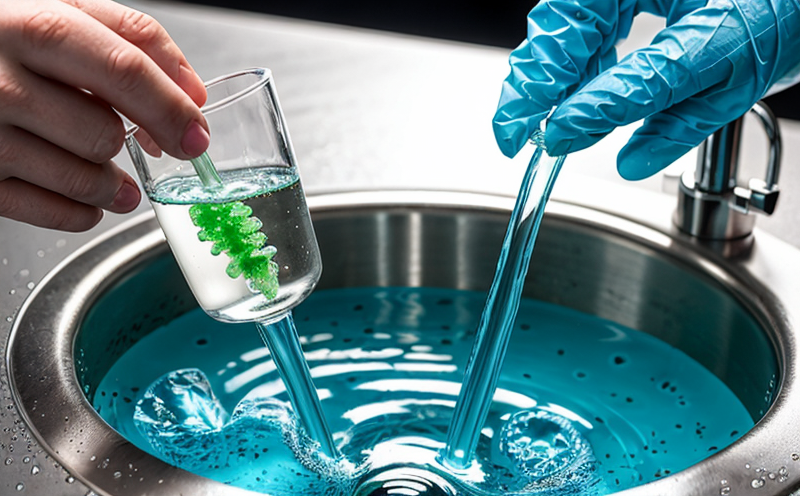AOAC 991.20 Listeria Test in Water
The AOAC Official Method 991.20 is a widely recognized standard used to detect and quantify Listeria monocytogenes in environmental samples, including water. This method employs culture-based techniques that are both sensitive and reliable for identifying the presence of this pathogen, which poses significant health risks if present in drinking or recreational waters.
The protocol involves several critical steps to ensure accurate results. Initially, water samples are collected from various points within a facility, ensuring representation across different zones. These samples then undergo a series of dilutions and inoculations into enrichment broths designed specifically for Listeria growth. The incubation period allows the pathogen to multiply, enhancing detection sensitivity.
The method's primary strength lies in its ability to detect Listeria monocytogenes even at very low concentrations, making it essential for safeguarding public health and maintaining compliance with regulatory standards such as ISO 11290-1. The use of this standard is mandated by numerous authorities worldwide, including the World Health Organization (WHO) and Food and Drug Administration (FDA).
The process concludes with the identification and quantification of Listeria colonies using confirmatory tests like serological testing or molecular techniques such as PCR. This ensures accurate differentiation between species and strains, providing a robust foundation for actionable decision-making.
In summary, AOAC 991.20 is crucial for ensuring water quality meets stringent safety standards, thereby protecting public health from the threat of Listeria contamination. Its rigorous methodology and compliance with international standards make it an indispensable tool in environmental microbiology laboratories.
| Step | Description |
|---|---|
| Sample Collection | Collect water samples from different points within the facility. |
| Dilution and Enrichment | Inoculate samples into enrichment broths for Listeria. |
| Incubation | Incubate enriched samples to allow pathogen growth. |
| Identification | Distinguish between Listeria monocytogenes and other microorganisms using confirmatory tests. |
| Quantification | Quantify the number of colonies per unit volume to determine concentration levels. |
Why It Matters
The AOAC 991.20 Listeria test is pivotal in ensuring public health and safety, especially given the severe health risks associated with Listeria monocytogenes. This pathogen can cause listeriosis, a serious infection that affects individuals, particularly pregnant women, newborns, older adults, and those with weakened immune systems. The detection of this microorganism in water supplies is not only a regulatory requirement but also a critical measure to prevent outbreaks.
Regulatory compliance is paramount for facilities like municipal water treatment plants, food processing plants, and recreational water parks. Non-compliance can lead to severe legal consequences, including fines and reputational damage. Moreover, the presence of Listeria in water supplies can have broader implications, affecting industries reliant on clean water sources.
The importance of this test extends beyond mere compliance; it plays a role in safeguarding public health by ensuring that environmental samples are free from harmful pathogens. By implementing AOAC 991.20 testing protocols, organizations demonstrate their commitment to maintaining the highest standards of quality and safety, thereby gaining consumer trust.
In conclusion, the significance of this test cannot be overstated. It is a cornerstone in the fight against waterborne illnesses, ensuring that critical infrastructure remains safe for public use.
Eurolab Advantages
- Comprehensive Expertise: Eurolab boasts over two decades of experience in microbiological testing, including extensive proficiency with AOAC 991.20 methodologies.
- State-of-the-Art Facilities: Our laboratories are equipped with the latest technology and equipment to ensure accurate and reliable results.
- ISO/IEC 17025 Accreditation: Eurolab is ISO/IEC 17025 accredited, ensuring that our testing services meet international standards for accuracy and reliability.
- Dedicated Staff: Our team of experts includes microbiologists with specialized knowledge in environmental sample testing.
- Comprehensive Reporting: We provide detailed reports that not only list the results but also interpret them within the context of public health and safety.
- Regulatory Compliance: Eurolab stays abreast of all relevant regulations, ensuring our services meet or exceed legal requirements.
At Eurolab, we are committed to providing high-quality testing services that contribute to maintaining safe water supplies. Our expertise and commitment to excellence make us the preferred choice for organizations seeking reliable microbiological testing solutions.
Use Cases and Application Examples
- Municipal Water Supply Monitoring: Regular testing ensures that public drinking water meets safety standards set by regulatory bodies like WHO and FDA.
- Food Processing Plants: Testing is essential to prevent contamination of raw materials or finished products, protecting the food supply chain.
- Recreational Water Parks: Ensures that swimming pools and other water features are safe for public use, reducing the risk of illness from contaminated water.
- Food Service Establishments: Monitoring helps in maintaining hygiene standards and preventing potential outbreaks due to cross-contamination.
- Water Treatment Plants: Continuous testing is necessary to ensure that the treatment process effectively removes pathogens like Listeria monocytogenes.
- Retail Chains: For water-based products, such as bottled waters or beverages, regular testing ensures product safety and consumer trust.
| Regulatory Body | Standard | Methodology |
|---|---|---|
| WHO | ISO 11290-1 | AOAC 991.20 Listeria Test |
| FDA | FSMA (Food Safety Modernization Act) | AOAC 991.20 Listeria Test |
| EPA | CW-3 | AOAC 991.20 Listeria Test |





